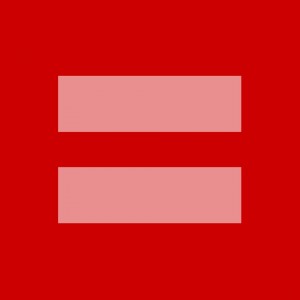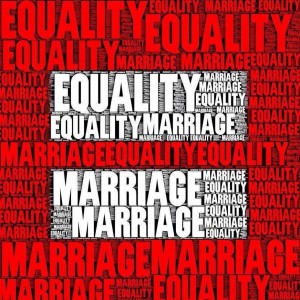The Red equality symbol

In this moment, it feels like the time is absolutely right to finally post my very emotionally charged attempt at rationally explaining my views and how I reconcile being a frum (religious/Orthodox) Jew and a straight ally for gay rights.
I support the rights of all consenting adults to have a civil marriage which is recognized to the fullest extent of the law.
To explain what it really means requires a bit more explanation.
Quite simply, I have two separate marriage documents: a civil one and a religious one. The first was issued to me by the State of Colorado. It was signed by two friends in my synagogue on my wedding day, but it just as easily could have been signed in the city and county office building or on a mountaintop. This says that D and I are married in the eyes of the law. I can change my name to his, add him to my health insurance, get the tax benefits both on a state and federal level, and make medical decisions for him should he ever need me to. The second was issued to me by my religious institution. My ketubah was signed by two kosher witnesses (men who keep the laws of Shabbat and Kashrut) under my chuppah. This document recognizes my marriage in the Jewish community and affords me a few specific rights as such. So while it is very important to me that I have them both, neither has any bearing on the other.
So why does religion become a component of civil marriage? My best guess is that for many, it is harder to see this clear distinction. My two documents were signed by different people (spouses actually) at different times, and are handled in a very different way. My ketubah is also a piece of art which hangs on my wall and my civil marriage license (which is how we refer to it) is in a pocket on the back of it. (Ironically, we brought a copy of only the civil one to Israel with us.) I know that both are important to me, but neither one is more or less important to me. They grant me separate but equal things which I as a heterosexual, religious, married woman am blessed to be able to sometimes take for granted. To me, they are the quintessential statement of the separation of church and state.
Basically, my theory is that first part, the part I had to go to the courthouse to get and affords me legal rights, not only in the state I live in but also in any state I ever travel through or move to and also on a federal level, should be available to consenting adults – regardless of who they are marrying. (Lets not get too much into the nuances there.) That should be the only component which is handled legally, and in a way which carries inter-state legal weight also. Then if you so desire, you can have another ceremony and/or celebration with any religious, spiritual, or other special rituals which are relevant to you and your community. The couple can seek out a way to embrace it in their own way, with as much or as little religion as is appropriate in each unique relationship. I truly believe that this is the only way to secure civil rights for all, while also maintaining the religious freedoms so many in the United States of America cherish.

Melissa’s current profile photo
So yes, I changed my profile picture for these two days of the hearing to one of the Human Rights Campaign (HRC) red equality symbol spinoffs and while I know it won’t actually make a difference to SCOTUS just how many of us did and they won’t make their decision for months – it makes a difference to my friends and family. For those for whom this isn’t a hypothetical question, for those who are not able to have their marriages recognized, for those who can’t file taxes jointly or legally change their names, for those who want the chance to have what so many of us take for granted – to all those people in my life, it makes a difference that I stand with them. I am not in DC. I cannot stand up and share my thoughts at SCOTUS. But I can change my profile photo for two days (though, I think I’m going to keep it all week), I can publish this blog post, and I can continue to hope and pray that those in the position to make the change can see this as the civil rights issue it should be and not the religious issue it has become.
You may note that I did not address the “biblical issues” around homosexuality, and that is on purpose. I think it is very deep, dark, muddled waters which I am in no way prepared to address in such a public way. [And even if I was, who am I (or any of us really) to say that every American should be held to my understanding of religious texts? I’m not a lawyer, but I’m pretty sure that is protected by the First Amendment.] It is because of this that I am turning off comments on this post. If you have something to say, you may email me directly and if you like the post, feel free to share it or simply “like” it via the built in WordPress function below.
